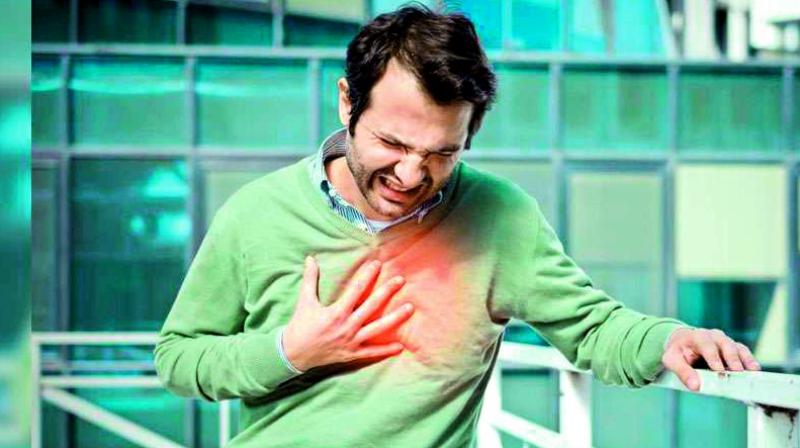Never too young for a heart attack
Given the stresses that a modern lifestyle brings with it, it's vital for you to evaluate your risk of developing heart disease.

In India, four people in the age-group of 30 to 50 years suffer fatal heart attacks every minute. And according to the Cardiology Society of India, 25 per cent of the people who die of heart attacks are less than 35 years of age. Unfortunately, the risk of cardiovascular disease is not taken seriously by the country’s young population.
The cardiovascular disease-related death rate in India is 312 per 1,00,000 individuals, which is significantly higher than the global average of 235 per 1,00,000 individuals. The premature mortality in terms of years of life lost because of CVD has increased by 59 per cent from 23.2 million in 2006 to 37 million in 2016, points out Dr A. Sai Ravi Shanker, a senior interventional cardiologist and the general secretary of the Telangana chapter of the Cardiological Society of India.
Q1. Why do young people suffer from heart attacks?
Some of the important causes of premature heart attacks are tobacco consumption, a family history of heart disease, unhealthy food habits leading to high cholesterol levels, and the lack of physical exercise. In some cases, the use of steroids for body-building, the indiscriminate use of painkillers, and drug abuse have also been found to be associated with cardiovascular disease.
Q2. Is lifestyle-related stress a major cause for the advancement of heart conditions?
In the Indian population, heart attacks occur eight to 10 years earlier than they do in western populations. These days, people experience high levels of physical and mental stress, especially the young, who have highly-competitive jobs. This combined with the fear of failure keeps them on the run all the time and increases the risk of early onset of heart conditions.
Q3. Are there any clinical causes of heart attacks that are not lifestyle-related?
Some causes of sudden cardiac death have been identified in young people. For example, an inherited condition can lead to the thickening of heart muscles, which can cause sudden death among athletes. Other causes include abnormal heartbeats, abnormalities in the coronary artery, Long QT Syndrome and Brugada Syndrome. Deaths caused by these conditions occur without any warning or indication.
Q4. How can the risk of heart disease be identified in younger patients?
If you have been diagnosed with hypertension or diabetes, or if you’re a chronic alcoholic or smoker, you should have a heart check-up done at least once a year. If you suffer from chest pain accompanied by breathlessness and profuse sweating, contact a doctor immediately.
High blood pressure can lead to the development of other serious health conditions in teens and young adults. An increase of 20 mm Hg in systolic BP or 10 mm Hg in diastolic BP increases the risk of a heart attack by 33 per cent and the risk of a stroke by 35 per cent.
So every person over the age of 18 should have his or her blood pressure measured regularly.
Q5. Can people suffer silent heart attacks?
Yes, in some cases, a person may suffer a heart attack without realising it and survive. Such a heart attack is only picked up when the person comes in for a routine electrocardiogram (ECG), or when a second, more major heart attack brings them to the hospital.
Q6. What is the medical management that is required after a heart attack?
A primary angioplasty is the course of treatment adopted when the patient visits a cath lab within three hours of the golden hour. These days, next-generation clot-dissolving medications may also be administered under medical supervision.
After suffering a heart attack, a patient should:
- Regularly consume the prescribed medicines
- Quit smoking
- Avoid alcohol
- Exercise for at least 30 to 40 minutes per day, as advised by the doctor
- Modify their diet to include more salads, vegetables, fish and fruits.
- Also, avoid overheating and reusing cooking oil
- Regularly have the blood pressure, sugar and cholesterol levels checked
- Avoid any sexual activity for three months after the heart attack
- Don’t remain seated for a long stretch of time; take a break and walk around at least once every half hour.

